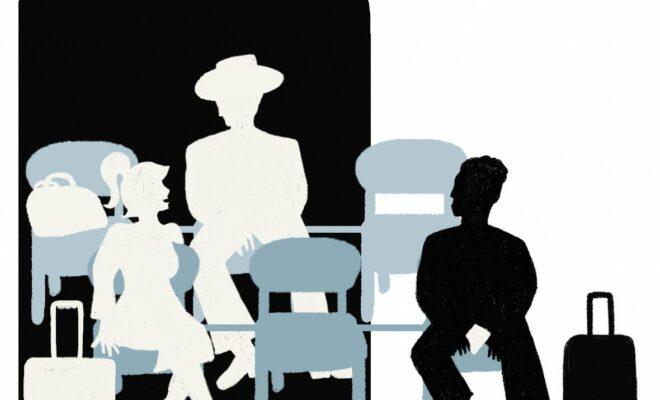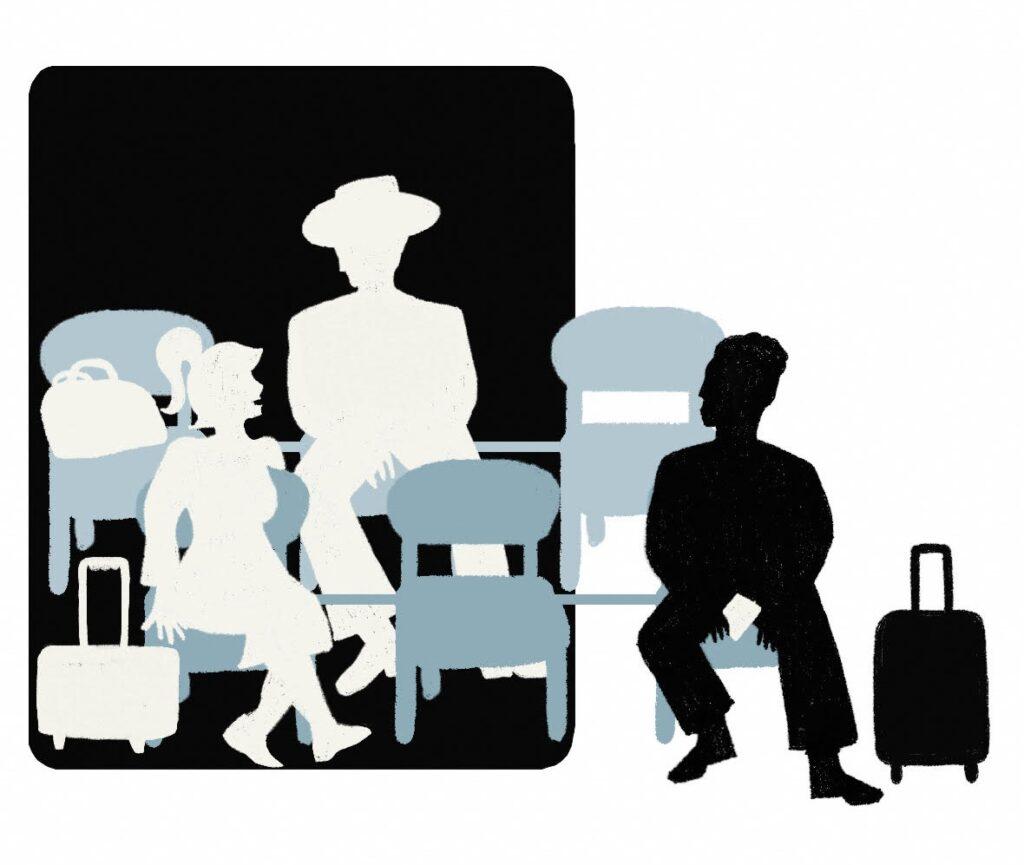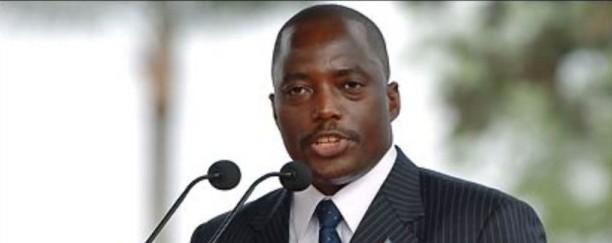“Why are you breathing in Europe?”

Cameroonians can’t move freely in Africa. We get profiled in airports beyond the continent. And that’s if you can get a passport in the first place.

Illustration by Diana Ejaita
This essay is part of a six-part series guest edited by Nanjala Nyabola. Additional editing by Ayodeji Rotinwa. Illustrations by Diana Ejaita.
Last December, I set out to renew my passport as the current one inched towards expiration. I had expected the process to be less cumbersome and faster as compared to 2015 when I last applied. The General Delegation for National Security – the government department in Cameroon in charge of issuing identification documents – had said that because French digital security company Gemalto was contracted to produce the passports in 2016, it would all be a lot easier. None of the fraud or counterfeiting associated with the previous contract holder, Thales Security, would be tolerated.
So, I went to the application centre in Yaoundé with high hopes. I had also thought that being a journalist, I would at least get some kind of preferential treatment. Those hopes didn’t last long. I would later learn that Thales Security had indirectly staged a come-back by acquiring Gemalto as a subsidiary, and the more things had changed, the more they had remained the same.
“Come back tomorrow,” a police officer arrogantly told me in French, without even bothering to find out what had brought me there. The following day, I could not be admitted into the centre on the flimsy basis that my birth certificate and ID card had been certified in a different administrative jurisdiction. I kept on receiving one complaint to another, which increasingly left me frustrated because my travel was drawing near. The only option was using the back door – a systematic channel developed by the authorities to make money from desperate passport seekers.
For some inexplicable reasons, Cameroonians are continuously told there is a shortage of prefabricated booklets for the production of passports. But if you’re willing to part with some money, the story is different. With great reluctance, I doled out FCFA 250,000 ($420), or three times the normal price for a Cameroonian passport, just to get the process started. The next day, my little forest green booklet was ready. I marvelled at the swiftness with which my application was processed and my passport ultimately produced: the normal procedure takes six months or more for a passport valid for only five years, unlike other countries with 10-year passport validity.
When the officer handed the passport to me, the police agent expected me to jump to joy and give more kickbacks as though I had just gotten clearance from an angel to enter paradise. The officer was clearly oblivious of how useless the passport can be, and how stressful it is to travel with it.
The 2020 Henley Passport Index, which ranks countries worldwide by the strength of their passports, puts Cameroon at the 93rd position – behind all of its neighbours in the Central African sub-region, except DR Congo. Cameroon lost one spot on the ranking as compared to last year, and holders of the Cameroonian passport can only travel to 49 other countries visa-free or with a visa-on-arrival. The top countries on the ranking, Japan, Singapore, Germany and South Korea, give their passport holders visa-free/visa-on-arrival access to over 189 destinations globally.
Ever since I acquired my Cameroonian passport, I am yet to travel with it stress-free, despite travelling to or transiting through around 15 countries. For instance, as one of the finalists of the inaugural True Story Award, I was invited to Switzerland in August 2019 to attend the Reportagen Festival Bern and award ceremony. I applied for a Schengen visa two months before at the Swiss embassy in Yaoundé. I was confident enough that I would be granted the short-stay visa, mindful of my travel history and the supporting documents I submitted. But none of that mattered, because I carry a Cameroonian passport.
“Your intention to leave the territory of the Member States before the expiry of the visa could not be ascertained.” This was the curt response I got from a refusal of visa note served to me by a clerk at the Swiss embassy. The officials concluded that I was very likely not going to return to Cameroon after entering “heaven”. Even my proof of permanent employment, bank statement and proof of family ties at home could not convince them. It finally took an appeal to the State Secretary for Migration for me to be granted a single-entry visa, for the exact entry and exit dates I had mentioned in my application.
I thought that getting the visa would be the last embarrassment in my trip, but it was only the first. After navigating the often-corrupt and cash-crazy immigration officers at Cameroon airports, I headed for Zurich via Istanbul on a Turkish Airlines flight. While on transit in Istanbul (Turkey), an unusual check was carried out on me.
I was the only black person in the transit zone, tired and listening to some Bikutsi music. A white lady working for Turkish Airlines approached me, walking past other people in the hall. It turned out that she was not convinced her African colleagues had verified my visa properly. Airlines have the responsibility to ascertain the passengers they transport have appropriate visas for their destination, otherwise they face hefty fines. So the lady asked for my passport and boarding pass, which I immediately handed to her.
The Turkish Airline staff (not an immigration officer) felt up the visa page, while examining it to make sure the visa and the passport belong to the same person. She was unconvinced, so she called over a superior, and both of them passed the visa under a UV detector to authenticate it.
When she was finally sure I had a genuine Schengen visa, she still didn’t hand my passport back. Instead, she peppered me with a set of silly questions that my passport and boarding pass could easily answer. “What do you do for a living?” “Where are you going to?” “What are you going there for?” “Do you have a return ticket?” She actually asked why I was going to Switzerland when I also have a Canadian visa in my passport. This was the question that broke me. I asked her flat out – “I guess your next question will be ‘why are you breathing in Europe?’” The lady immediately returned my passport and moved away. I was the only passenger subjected to such a treatment amongst the hundred of us travelling from Istanbul to Zurich.
Travelling while African requires the patience of Job. You have to stand in long queues reserved for travellers with “Other Passports”. If luck isn’t on your side, your skin colour will betray you into being sorted out for questioning or to verify the contents of your bag, and for women, sometimes the contents of your hair. It’s as if the Cameroonian passport has a secret inscription: “The bearer is a potential threat: Treat with caution.”
But it’s not just in Europe that we face these challenges. Despite the African Continental Free Trade Area and the call for the free movement of persons and goods, African countries are still stifling movement of people across their colonial borders. The Africa Visa Openness Report 2019 shows that Africans can only travel visa-free to 25% of other African countries.
My most bitter experience with visa acquisition has been on the continent. Getting a visa to travel to South Africa was like an elephant going through the eye of a needle. After putting together several unnecessary documents, the local staff at the embassy asked me to bring a confirmed flight ticket in place of a flight booking, as though I was not going to travel after all the psychological torture. This was this year, long after leaders on the continent had announced a promise of imminent free movement. And it cuts even deeper when you see holders of passports from Europe and North America easily fly in and out into many African countries.
It is often tempting to drop the Cameroonian passport, get a locally-acquired foreign accent and pick up a more powerful passport in order to roam free across the globe, but for the time being, I’m going to hold on to mine.






What an experience
I also passed through the backdoor to have a passport in Cameroon
I feel your pain, born with European back round, living in South Africa, my passport was never to be renewed, why you’ll ask. Because we were whites living in the apartheid years. Ten years after Mandela took over, I was able to get it back, huge cost involved but yes worth it. My South African husband only had the RSA passport, and he worked outside South Africa a lot. Same problem,you’re restricted. Once we were on family visit in Europe, we boarded a flight home from another country, the result, emigration knocking on the family’s door to find my husband.
Africa is the richest continent in the world. African superiority has just started. Declared by David Kipkoech Mitei Kiplangat arap Rono
I feel so bad for you & for so many other Africans, including myself, for the mental & financial torture we have to pass through whenever travelling outside Africa. However, lets ask ourselves how do we Africans treat each other. How can we blame others if we Africans mistreat each other by complicating the visa process, which should not even exist, while letting the westerners a visa-free access into our continent? Just imagine how many ranks will our passports progress in the world index if we would open our countries for each other.
Dignity starts at home. If you’re not dignified at home, never expected abroad. After all, these are the very same people who came to Africa to enslave & colonize us.
Peace
From frying pan to fire.
Holding a Nigerian passport as a Cameroonian
Hi Amindeh,
I hope and pray all is well. It is not the passport that is the problem. It is the European/white supremacy system that is the problem. Even if you are a Black person with one of the most so called powerful passports. You will still be harassed.
Yahrusalem and Baruch my brother,
Louis
Appalling! Africans will forever be subjected to this kind of dehumanization unless we refuse to tolerate it anymore!
This has to come to end and it starts with informing each and every African person, of these realities, out there. I feel for you and am deeply touched with what you had to go through. This unfair treatment of Africans in movement is one of their targets to keep our mind limited because it is through travelling that every being unleashes their inner most potential and expand their knowledge.
So the first step in revolutionizing Africa should be to loosen movement restrictions to Zero percent, both on the continent and outside, for Us as Africans to be able expand our thoughts and our capabilities beyond Africa. FREE MOVEMENT is power, Every African should be educated on this aspect and have the duty or responsibility of informing as many Africans as possible because many of us Africans lack information of what is going on. I deeply thank you for sharing your travel experience in this article i request for your permission to disseminate this powerful article, your quickest response will highly be appreciated.
Of Africa
For Africa
By Africa
cloroquine https://chloroquineorigin.com/# hydroxychloroquine risks
cialis generic cheap cialis
cialis dosage buy cialis usa